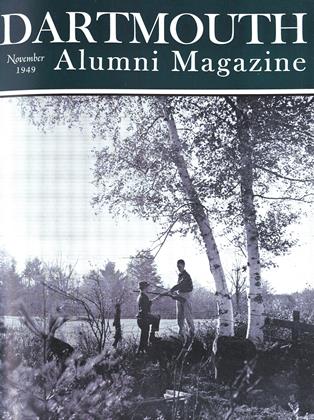THE 646 seniors taking the required Great Issues course this semester give all the lecturers the pleasant reality of talking to a full house. Faculty "auditors" who want to be sure of getting the few remaining seats in 105 Dartmouth have to get there early. Not so the wives of students in the course; they repair to Went-worth Hall where they can hear broadcasts of the Monday night lectures (all preserved by microphone and tape recorder also). Far from being an act of gallantry, the accommodation of wives is a pedagogical effort to stimulate discussion of great issues outside the classroom.
"Great Issues" this fall entered upon the third and final year of the test period that President Dickey and the steering committee have felt it should have. The $75,000 grant from the Carnegie Corporation was made with such a three-year trial period in mind. As President Dickey has stated, two years have demonstrated that the course can be given successfully; the $64 question is whether the pace and the tremendous effort put into the course can be maintained.
Under the direction of Arthur E. Jensen, Professor of English, who heads the course at present, "Great Issues" in its third year is following the general pattern of the first and second years. The two main sections announced thus far deal first with "The Perspective" and then with "Freedom for the Good Society." Lecturers for Section I included Professor Jensen; President Dickey on objectives; John M. Clark '32, editor and publisher of The Claremont Eagle, on "The Use of Newspapers"; Joseph Barnes, former editor of the New York Star, "The Context of Our Times"; and Beardsley Ruml '15, "Some Issues of Choice and Duty."
Visiting lecturers for Section II include President W. K. Jordan of Radcliffe College, "The Growth of the Idea of Freedom"; Prof. T. V. Smith of Syracuse University, "The Meaning of Democracy"; Prof. Lyman Bryson of Columbia University, counsellor for the Columbia Broadcasting System, "Freedom of Expression"; Lewis Mumford, "The Function of Freedom"; Prof. John D. Black of Harvard University, "Conservation"; Senator Ralph E. Flanders of Vermont, "Responsibilities of Management in a Free Society"; Daniel Schwartz '36, director of organization, United Public Workers of America, CIO, Michigan Region No. 6, "The Responsibility of Labor in a Free Society"; and Hodding Carter, editor of the Delta Democrat Times, Greenville, Miss., "The Racial Dilemma."
Eight members of the Dartmouth faculty are also serving as lecturers or discussion leaders in Section II. They include Dayton D. McKean, Professor of Government; Francis W. Gramlich, Professor of Philosophy; William A. Carter '20, Professor of Economics; Roy P. Forster, Professor of Zoology; William P. Kimball '28, Dean of Thayer School; John H. Wolfenden, Professor of Chemistry; J. Edward Walters, Professor of Management and Industrial Relations, Tuck School; and Robert K. Carr '29, Professor of Government.
Though completely unscheduled, the highlight of "Great Issues" to date probably was reached Monday night, October 3, when Dean Acheson, Secretary of State, dropped in on the course and spoke briefly. Mr. Acheson, who lectured in the course last year, came to the class meeting with President Dickey whom he was visiting for a few days as part of a short New England vacation.
 View Full Issue
View Full Issue
More From This Issue
-
 Class Notes
Class Notes1918
November 1949 By ERNEST H. EARLEY, DONALD L. BARR, DAVID L. GARRATT -
 Article
ArticleConvocation Address
November 1949 -
 Class Notes
Class Notes1897
November 1949 By WILLIAM H. HAM -
 Article
ArticleEnglish Climbing Boys
November 1949 By JOHN HURD '21 -
 Class Notes
Class Notes1923
November 1949 By TRUMAN T. METZEL, COLIN C. STEWART, 3rd -
 Class Notes
Class Notes1912
November 1949 By HENRY K. URION, RALPH D. PETTINGELL, HENRY B. VAN DYNE
C.E.W.
-
 Article
ArticleConvocation
November 1949 By C.E.W. -
 Article
ArticleThe Moral Supports or Education
October 1951 By C.E.W. -
 Article
ArticleFinancial Aid Goes Up
December 1951 By C.E.W. -
 Article
ArticleFINANCES
DECEMBER 1962 By C.E.W. -
 Article
ArticleTHEIR OWN RESPONSIBILITY
DECEMBER 1962 By C.E.W. -
 Feature
FeatureAlbert I. Dickerson '30 1908-1972
JULY 1972 By C.E.W.
Article
-
 Article
ArticleWORK OF BOSTON ARTISTS EXHIBITED IN ROBINSON HALL
February 1921 -
 Article
ArticleRUSHING SEASON ADVANCED
December 1921 -
 Article
ArticleStatement of Ownership
November 1982 By DENNIS A. DINAN, Editor -
 Article
ArticleHE-MAN SALON
January 1944 By Robert B. Hodes '46, USNR -
 Article
ArticleThe Undergraduate Chair
April 1944 By Robert B. Hodes '46, USNR. -
 Article
ArticleGRADUS AD PARNASSUM
December 1940 By The Editor.


